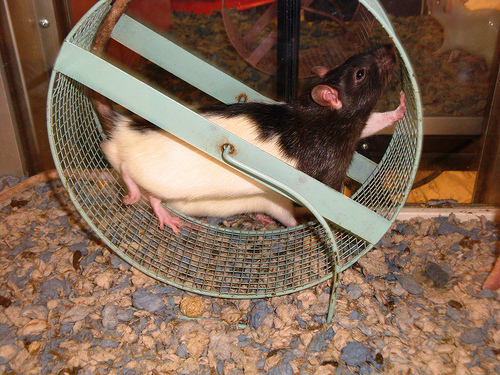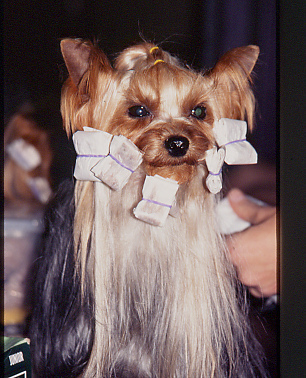Tuesday Tips: Media Training & Finding Targets

Join the rat race--you want to, you KNOW you do!
This is the third in my latest Tuesday Tips series, this time on media training for authors. You can read the first installment about why media is important, and the second installment describes traditional vs "modern" media. Today the blog is all about targeting your media.
GO LOCAL
Folks relatively new to media appearances should start with local radio and TV targets. First, they're generally more open to the home-grown author/cause so you have a better chance of actually booking an appearance. But more than that, you know them (or should!) from watching and listening to your local news anchors and radio hosts.
Think about it the same way you'd send a query to a publisher or magazine editor. If you already have a relationship with them, you're paw-steps ahead of the pack. But when you've never pub'd with them before, writers research that market. You wouldn't pitch a romance novel to a venue that only publishes text books. Writers are told to "read three issues of the magazine" before pitching so you should also study the media targets in the same way. Makes sense, right?
So make your wish list. Google TV/Radio + "your town" and/or browse the channels. Take notes on which stations AND REPORTERS do hard news vs "fluffy" content; if they do live interviews or not; do they feature "home town heroes;' what events do they cover extensively, etc. You'll likely see some difference in topics between your local ABC, CBS, NBC, and FOX (or other networks). Remember to check local cable access. While the network shows usually limit interviews/stories to between 2-4 minutes, a cable feature show might give an author 20+ minutes air time. Prime time radio also has shorter segments available, often 5-10 minutes, but smaller stations during non-peak hours might offer a much longer interview.
Most TV and radio stations now have a web presence (how convenient!) and list the folks who get air time often with a bio and phone/email contact. Get to know them!
My local affiliate happens to love pet stories–lucky me–and even brings their own pets sometimes on air. Maybe one of the news anchors is engaged and might be interested in your sassy romance protagonist, or the hard news guy love the fact you interviewed the FBI or did a cop ride-along to research your thriller. Pick the right match for what you're selling.
For TV, the guest interviews tend to happen during the morning (sometimes EARLY morning slot) and the noon hour. Radio varies depending on the audience. Drive time (early morning) shows tend to feature shorter interviews with hosts eager to entertain–sometimes at the guest's expense–so be prepared to roll with the punches IF that's your audience.

You don't need glamour to go national.
GO NATIONAL
Much of the same information applies–but your research is a bit more difficult since you don't have that local access. A national venue also wants a topic/author/cause with national reach and frankly, it's hard to got these slots on your own. Most of my national appearances happened as a result of the publisher's publicity team pitching me/my book–or they came to me for my expertise.
National venues expect a level of expertise. Practice at the local level if you've not done lots of media before. Get as much exposure as you can and don't discount your "home grown" experiences because great local stories get picked up by the national media, too. And as I said, once you're considered the expert, media opportunities seek you out.

Seren knows from platforms--do you?
PLATFORM BUILDING
Improve your chances of garnering national media interest by building your platform as an expert in your subject. Don't be afraid to tout your expertise–somebody has to call you a "nationally known expert in XYZ" the first time, and if it's on your blog…*innocent eye blink* that could get some mileage. Just be sure you ARE an expert.
What builds your platform? Blogging of course, guest blogging, being an author on the subject, and others referencing you and your work in their own publications. That actually can have the media knock on your door.
Don't discount writing for free. Yeah-yeah-yeah, I know the old-school journalists (I'm one!) will tell you not to give away the milk for free but in today's world there are some advantages in specific circumstances. That is, when you're building or expanding your platform to sell yourself/book/cause it can be helpful to share your "expert information" to the widest possible audience–because then they *may* come to you. I've had this happen more times than I can count with media ops reaching out because they've read something of mine–for free–on the Internet. In the case of authors, post excerpts of books or "guest blogging" for free on others' widely read blogs.
My colleague Gina Spadafori–an outstanding journalist and awesome pet writer–had been blogging for a while when the pet food recall blew up. She literally broke the story and then followed/dogged/rode that puppy providing in depth reportage few others could match. Already a well known expert, that event set her blog PetConnection heads and wagging tails ahead of the pack and got her quoted in the New York Times (among many others).
Start blogging BEFORE your book comes out. Use your name on the blog to generate name-recognition. Blog regularly. Go take Kristen Lamb's blog class (she's the expert) and/or buy her book because it's designed specifically for authors.

Prepare in advance.
You can also offer yourself as an expert to reporters (print and/or radio and tv). There are online services that publish lists of experts that media often fishes for their perfect guest. Some of these can be costly so buyer beware. A free service that I use and like very much is HARO– http://www.helpareporter.com/ HARO sends out an email blast to subscribers three times a day with lists of reporters' needs for interviews, quotes, TV appearances and more. As a result of using HARO I've been interviewed and quoted in Family Circle, New York Times, many dog/cat venues, Ladies Home Journal and others.
GO INTERNET
The Internet media is HUNGRY for great guests! You can find a "radio podcast" or a "Vlog" (video blog) and video web-series on virtually any subject. Simply do a search. Try typing "podcast + guests" or "webcast + your topic" and then vet the choices. As with the other venues, research before pitching. Listen/watch some of the past postings, find out (if you can) the audience/reach. But even if it's a relatively small following, the advantage of Internet media is the link that you can use on your blog, website, and other "pitches" as an example for other media.
Check out Facebook, too, because there are groups of pod-casters there you can network and find venues. Don't forget you can also DIY with YouTube. All you need is a video camera and internet connection. Editing your video is beyond the scope of this blog but often simple is best, without all the bells and whistles.
While podcasts can be short or long, the most successful video is short. You'll have more success with half a dozen 2-minute appearances than with a single 15-minute YouTube posting. Seriously, how long will YOU watch a YouTube video before clicking it off? Has to be pretty interesting to keep today's Internet audience.
And on that note–before I lose my audience–I'm clicking off. Dial me up next Tuesday Tips for the next installment.
I love hearing from you, so please share comments and questions. Do you have an ASK AMY question you'd like answered? Stay up to date on all the latest just subscribe the blog, "like" me on Facebook, listen to the weekly radio show, check out weekly FREE PUPPY CARE newsletter, and sign up for Pet Peeves newsletter with pet book give-aways!
Filed under: Tuesday Tips, Writing Tips Tagged: Amy Shojai, authors, cat books, dog books, Gina Spadafori, http://www.shojai.com, Kristen Lamb, media training, radio, tv, writers conference, writing, www.amyshojai.com


 [image error]
[image error]
[image error]
[image error]






